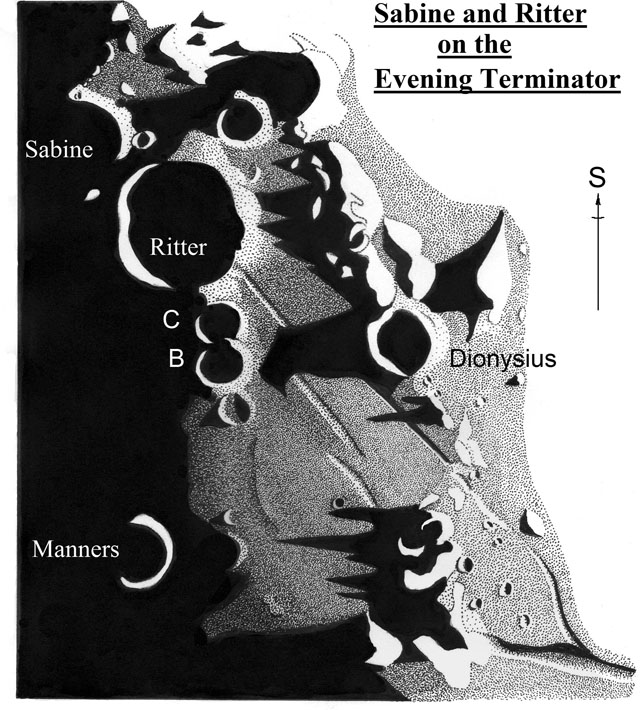Difference between revisions of "September 23, 2009"
| Line 2: | Line 2: | ||
=Crossing the Lines= | =Crossing the Lines= | ||
| − | + | <!-- ws:start:WikiTextHeadingRule:0:<h1> --> | |
| − | + | <!-- ws:start:WikiTextLocalImageRule:6:<img src="/file/view/LPOD-Sept23-09.jpg/90505693/LPOD-Sept23-09.jpg" alt="" title="" /> -->[[File:LPOD-Sept23-09.jpg|LPOD-Sept23-09.jpg]]<!-- ws:end:WikiTextLocalImageRule:6 --><br /> | |
<em>image by [mailto:philip.morgan@talktalk.net Phil Morgan]</em><br /> | <em>image by [mailto:philip.morgan@talktalk.net Phil Morgan]</em><br /> | ||
<br /> | <br /> | ||
| Line 17: | Line 17: | ||
<br /> | <br /> | ||
<hr /> | <hr /> | ||
| − | |||
| − | |||
| − | |||
| − | |||
Revision as of 22:49, 2 January 2015
Crossing the Lines

image by Phil Morgan
Like a pair of converging railway lines, the rilles, Ritter 11 and 111 head southeastwards across the shores of the Mare Tranquillitatis towards their parent crater. Just to the west is the crater Dionysius, and on this occasion it was casting a long shadow over these rilles towards the pair, Ritter B and C. When marial rilles are overlain by the shadows cast from nearby peaks and craters, detail about their surface topography often becomes apparent that is not normally visible. Whilst making this observation it seemed clear from the Dionysius shadow profile that the surface under the more westerly rille, Ritter 11, was domed upwards slightly, and as if to balance this, the Ritter 111 (nearest to Dionysius) was depressed. Whether or not this uplift and collapse was subsequent, prior or contemporaneous with the rilles formation is impossible to say, but it could be that the Ritter rilles are situated over a dike-like intrusion, and later movement of the magma brought about a subsequent uplift of the Ritter 11 rille. On this occasion the southeasterly continuation of the Rille Ritter 111, seemed to cut into the outer northwest rampart of Ritter, indicating that it may have formed later than this crater. At the northern termination of the Ritter 111, there appeared to be a faint connection of this rille with the Ariadaeus 1. This is the short southeastern branch of the great rille shown at the extreme bottom right of my drawing. This possible connection of these two rille systems was the subject of a previous LPOD, on August16, 2007. To the east of this rille system, and just north of Ritter, is the small pair, Ritter B and C. It is interesting to note that the southern cusp of B appears to actually intrude into its twin, C. This, however is an illusion, and is caused by the west wall of a very small craterlet, that sits just between, and links the pair.
Phil Morgan
Technical Details
Sept 10, 2009, 02:50 to 03:30 UT. 305 mm f/5 Newtonian 400X
Related Links
Rükl plate 35



